a space for queer people by queer people to share their thoughts, analysis, art, and writing; to be in community; to be prideful
Don't wanna be here? Send us removal request.
Text
On Bon Iver and queerness as separate from sexuality
Piper Gibson || July 30, 2018
Hey! Whoa, it’s been a while! I literally say that every time, I know, I’m sorry. A lot has happened, the biggest change of which being I graduated college! I’m putting more of a priority on my own creative work now, so hopefully I’ll be updating this page more often and maybe revamping the site... Keep an eye out! And enjoy this sappy Bon Iver essay.
When I first got into Bon Iver, sometime around sophomore year of high school, I liked the more typically marketable sad acoustic songs- Blood Bank, Beach Baby, Skinny Love, Holocene, etc. I loved almost all his songs, but I would skip over the “weirdest” ones. I was also very intensely struggling with compulsory heterosexuality and repressed mental illness. Both of these issues combined, and me being unable to admit they were even issues, led to my very low mental state throughout much of high school.
Bon Iver got me through a lot of that time. I used to put on a playlist of all of his songs to fall asleep to. I would listen to certain ones on repeat sometimes- his cover of I Can’t Make You Love Me/Nick of Time in particular, when I was needing a cathartically hopeless song. His gentle voice, the melodies, the soothing guitar, and the somber lyrics made me feel less alone, and I could dream of seeing him in concert one day when I couldn’t think of many other reasons to stay alive.
But there were certain songs I still didn’t listen to. They were too weird, too dissonant, and I chalked it up to them not being my “style.” That’s true in some cases; with almost any artist, there’s going to be songs I like less. However, that wasn’t entirely the case here. I thought I just plumb didn’t like songs like Babys or Woods until very recently, when I listened them while writing this essay. I don’t dislike them; I think they’re really interesting and different, and I can appreciate them even if I don’t love them in the same way I love Blood Bank or For Emma. Bon Iver’s latest album, 22, A Million, is something I absolutely would not have liked as a teenager. I would’ve thought it too weird, too obscure, too much of a departure from the soft, saccharine songs I loved from the artist. I would’ve yet again put it to Bon Iver going in a different creative direction than my own tastes. It’s happened before. But why didn’t I like this music of his?
It wasn’t because I grew and now am more willing to listen to different kinds and genres of music as an adult, although that’s part of it. I was so stuck in both compulsory heterosexuality and compulsory ablemindedness that I couldn’t let myself stray from “acceptable” music, either. Thinking about what I listened to then is, to be honest, quite hard; I was so confined. I listened only to songs that made sense within societal expectations of popular music, and if I strayed from that at all in terms of Bon Iver or Mumford and Sons, it was still the least “weird” songs, the most pleasant and radio-worthy music of those artists. I think this really was connected to what I felt I couldn’t share about myself: the deviancy, the abnormalness, the “wrong” parts of myself I was so terrified would get out.
Queerness lies in these margins of acceptability- born out of defiance against norms that limit the human capacity for love, growth, and freedom. It only makes sense that music reflects this. And Bon Iver’s music is so fucking queer. It strikes me in a way I can’t describe. It’s dissosant but harmonic, pretty in its ugliness. Bon Iver plays with distortion in a way I haven’t often heard; I think of the opening to “22 (OVER S∞∞N)” with Vernon’s voice pitched high, singing “two, do” and “it might be over soon”. Throughout the song, his voice is electronically stuttered over and over again, leaving a sort of reckless, frantic impression, despite the relative calmness of the track. He does this in so many songs, especially on 22, A Million, making music that defies the boundaries of what is usually played on the radio or winning accolades at awards ceremonies. He makes up words, he layers instruments over themselves, he pitches his voice up and down, making the listener unsure of what exactly they’re hearing. Not to mention imagery like on “33 ‘GOD’” -- a rainbow with the word “GOD” over it-- that I can’t imagine being associated with much else than queerness.
I’m not trying to imply that Justin Vernon, the man himself, is queer-- what I’m suggesting is that, perhaps due to his own struggles with mental illness, he is creating music that queers the nature of music. I haven’t heard music like his much outside the queer community-- artists like Sufjan Stevens and Against Me! in particular, as well as honorary queers The Mountain Goats-- and that says something to me about how different and special it is. Music is a vehicle to express ideas and emotions, and Bon Iver is expressing something that seems so incredibly queer to me, not in terms of identity, but theory and concept.
What is so beautiful to me about being queer is the freedom. And this seems like an oxymoron, when queer people all over the world are still restricted, jailed, abused, and killed, but it’s the sort of freedom that reaches beyond that. Queer freedom is freedom from heteronormative expectations, from mainstream fashion, from acceptable music and narratives and life paths. Listening to Bon Iver feels free. He’s not trying to get on the radio (at least not anymore) or be famous, he just wants to express himself and connect with people who understand the complex emotions he gets across.
I finally saw him in concert this May, making my suicidal teen self cry inside, and my sentimental adult self cry on the outside. Seeing old songs and new songs mesh together on stage, with ugly guitar riffs and beautiful big band instruments and a wild mishmash of patterns and lights flash on the wall, filled my queer heart all the way up.
That’s what’s so hard to get across about why queerness isn’t just about sexuality-- it’s a nebulous feeling, one that makes you cry at concerts where you’re probably surrounded by straight people. It’s about deviance and love and freedom and emotion, and I can’t think of a better embodiment of that in my life than Bon Iver’s music.
0 notes
Text
Some Notes on Charlottesville and “Fighting Hate with Hate”
Piper Gibson || August 16, 2017
(Note: This was posted on my Facebook first, but I thought it’d be pertinent to share here as well.)
I’ve been working on what exactly to say for the past few days, because I’ve seen a lot of sentiment online that makes me really upset and uncomfortable-- namely, a privileged neutral-ish stance about how “hate is bad in all forms,” or about how there was violence “on both sides.” To my fellow white people-- especially white and gentile people-- who say that we need to fight this abhorrent hatred with love, or to continue to offer compassion and a healthy discussion to white supremacists, I offer this quote I found online yesterday:
“Racism, nazism, etc. are inherently unreasonable ideologies and cannot be reasonably debated. To attempt to do so is to say that their ideology can be defeated by classical argument, which, of course, it cannot - it is built on hatred, not universal truths.”
There is a limit to my compassion and my emotional labor. I will have a discussion with someone expressing oppressive views to try and halt those views and make them understand that they are being hurtful. That is a different situation than white supremacists who shouted “Jews will not replace us” and “white lives matter” among other things this weekend, not to mention running over a woman with a car and killing her, and injuring dozens of others. I will not negotiate or discuss with these people; their ideology is unreasonable and founded upon the idea that people of color, Jewish people, Romani people, Muslim people, disabled people, and queer people (the list goes on) are not only lesser than them, but lesser than human. Those who dehumanize others so often that they feel comfortable expressing their desire to commit genocide on television unmasked are not people worth extending my compassion to. They are more far gone than a respectful exchange of ideas. And I do hate them.
I don’t understand how “I hate Nazis and white supremacists” is a bold political statement to make. I don’t care if it’s hateful. I have hatred for Nazis. I have hatred for those who would willingly wipe out an entire race, a culture, a religion, an ethnicity, an identity. I have hatred for those who strike fear in the hearts of people all across the country and make them less willing, safe, and able to be fully themselves. People of color already bend over backwards to make white folks comfortable for their own personal safety, lest they be shot because they were wearing a hoodie, or had a toy gun, or whatever else bullshit reason people make up after a human being is already dead. We don’t need to make this even worse by refusing to acknowledge white supremacy and making empty statements about love trumping hate. Racism is uncomfortable. The reality of it plays out in situations like Charlottesville or Ferguson or Flint. It is impossible to ignore any longer. Your privilege shows when you attempt to do so.
And no, I don’t think all hate is destructive. I could hate something that happened years ago and let that hurt me, but my hatred towards Nazism and white supremacy and other systems of oppression in this country does not make me smaller or lesser. It fuels me. It connects me to other people filled with anger and disgust for what has been happening in this country not only this past year, but our lifetimes and beyond that, to the very foundation of this country built upon slavery and genocide. It makes me want to fight. It makes me less afraid.
There is no loving or talking away the kind of hatred Nazis have. When you will appear on television, unmasked, not caring who sees you, and declare your open disgust for entire swaths of people, it’s a little too late for you. Maybe these people can unlearn this hatred over time if they break apart from hate groups, but I’m more concerned with the safety of people of color and other victims of this poisonous ideology than I am reforming Nazis. And I agree that dehumanizing someone is never okay, but I’ll go a step further. Dehumanizing Nazis is unproductive; finding out their names, their jobs, pointing out that most of these people have families and dogs and say please and thank you is productive. Because these people are just that- people- and that’s what makes them so dangerous and so scary. They’re people that, for whatever reason, got sucked into an ideology that has led to genocide and systematic destruction of culture over and over again. Letting them be a huge faceless mob gives them power, but breaking them down to each individual person takes away that power. We can make sure that they know that if they’re emboldened enough (thanks to our current administration) to show their faces on television, we’re emboldened enough to get them fired. They’ve already ruined their hearts, their compassion for their fellow humans, so they should know the rest of their life is ruined, too. As I saw in another quote this week:
“If you want to be a goddamned weekend Nazi, you have to be a Nazi every goddamned day. You want to be a weekend Nazi? Then you face the fucking music on Monday… You get to suffer the natural consequences of your belief in the lesser humanity of others. You get to live the outcome of your violence, your acts of bigotry. You get to live your ugly truth, alone.”
People of color don’t get to stop being people of color, and Jewish people don’t get to stop being Jewish, and so on and so forth. Hatred is a choice. These people are choosing, every single day, to openly hate and want to kill entire groups of people for something they had no choice in, because they think they’re better than them, because they feel that their whiteness is threatened. I choose to hate them back. And I do believe that love trumps hate, in the way that I will fight back against racism and Nazism because I love the people who are under attack from it. I am fighting with love because I am fighting for humanity, for the belief that people are inherently valuable. The hatred in Nazism is not sustainable because it has no grounds; it is built upon dehumanization. My hatred will last until every white supremacist and Nazi is gone (so, probably the rest of my life) because it is built upon anger at injustice, love for those suffering, and hope for a better, less oppressive future.
In summary: There’s no loving your way out of this one, fellow white folks, unless you mean loving all the victims and supporting them in this tumultuous time. That is something productive you can do; listen, support, keep talking about this, educate others, show up, donate. What is unproductive is making empty statements about fighting hate with hate- it’s a little late for that. People are dying. They have been dying. This isn’t theoretical politics; Nazis and white supremacists have a platform and are using it to spread violence and fear, which has real-world consequences on lots of people. You are privileged if you can feel removed from this in any way, so you might as well use that privilege for good. Words aren’t all that matter anymore, you have to act on it. So, yeah. Punch a Nazi if you can. It takes away their power to share their platform and eventually act on their beliefs.
Here’s some links to donate if you are feeling helpless and want something concrete to do (list found here)
Solidarity Cville’s anti-racist legal fund: https://fundly.com/solidarity-c-ville-7-8-anti-racist-legal-fund?fref=gc
#A12’s general fund: https://fundly.com/ash-general-fund
UVA’s donation page for their Black Student Alliance: https://securelb.imodules.com/s/1535/16-uva/index.aspx?sid=1535&gid=16&pgid=1199&cid=2383&dids=409&BLEDIT=1
An article with a ton of links to great organizations: https://medium.com/@SaraJBenincasa/what-to-do-about-charlottesville-dfc7d6636d56
0 notes
Text
‘The Bold Type’ and Surface-Level Intersectionality
Piper Gibson | July 26, 2017
Long time, no write, I know. It’s hard, as a mentally ill person working and going to school and trying to stay politically aware in these trying times, to update this blog. But I’m back with another post, because I am annoyed.
I’ve caught up with The Bold Type, a new Freeform series which is about three friends who work at a women’s magazine and is currently airing its first season. As I’m writing this there’s four episodes, but each is packed with so much that rubs me the wrong way that I’ve been incessantly livetweeting on my (private) Twitter about it. I don’t even know where to start, so I suppose I’ll begin with a few things I like.
I like that it’s a women-driven show. I like that we get to see women in power and at the top of their game. I like that the side characters are kinda diverse. I like that it passes the Bechdel test in a major, major way. I like that they are at least trying to come from an intersectional feminist perspective. That’s actually why I’m really frustrated with this show, but I’ll talk about that more later.
Firstly. Jane, the kind-of main character (To me, she’s clearly the main protagonist, but it could be argued that her, Kat, and Sutton are all protagonists) is boring. I’m sorry. She just is the human embodiment of plain yogurt. I cannot bring myself to care about her budding career or mediocre hetero love life. I don’t care when she wins, and I don’t care when she loses. I guess to some, her story might be interesting, but I just... don’t... care. I feel basically the same about Sutton, but she’s a teense more likable because the glimpses of her backstory spark an interest in me. For Jane, I think the writers were going for a Gifted-Child-Who-Grew-Up-To-Need-To-Please-Authority-Figures vibe, which I can relate to, except I see basically nothing of myself in her. Maybe it’s the bland cishet girl thing, but she’s not doing it for me.
My main problem with this show is that they focus on Plain Jane (low-hanging fruit, I know, but I had to do it), who has the personality of a lightly-salted potato chip, way more than they focus on Kat, who is IMO the most interesting person on the show. For a series that’s at least kind of trying to be diverse, it’s frustrating to me that 2/3 of the main characters are white and cis and heterosexual, but anyway. They have two cis, heterosexual, white woman main characters and then a black woman main character who is questioning her sexuality. Who do you think a large portion of the viewership for a show that claims to be feminist is gonna gravitate towards? Not the pasty heteros, probably.
Kat is dynamic, and interesting, and good at her job, not to mention gorgeous as all hell. Yet they give her storylines like "Black Girl Who Grew Up Upper-Middle Class Has to Have Poverty Explained to Her by White Girl” and “Black Girl Living In Modern-Day America Somehow Doesn’t Understand Why A WOC Immigrant Might Not Want to Interact With Police” and “Black Girl Who Works at a Feminist Magazine Doesn’t Seem to Know About Bisexuality For Some Reason” and y’all. It’s honestly so tiring. I understand that Kat is the one with the majority of the interactions with Adena to set up the queer romance between them (which I love and appreciate) but this also means Kat is their point-girl to explain xenophobia and immigration issues to the audience.
I would like that they’re showing interracial ignorance issues, because people of color can be ignorant about and discriminatory towards other people of color, but I don’t think that’s what they set out to do. I think they wanted this to be a cool, hip, intersectional show, so they do a few kind of performative scenes where the Muslim lesbian woman on a work visa explains to another woman of color why she doesn’t take her hijab off or why she ran when the police showed up after a man assaulted her. At one point, Kat’s white boss actually explains to her that Adena ran from the cops because she could’ve gotten deported, which Kat hadn’t even considered somehow. What this actually does is tell the audience that Kat is ignorant on issues pertaining to women of color, and since Jane and Sutton literally never have race discussions beside one throw-away line about the Civil War from Jane, it feels like race is a topic secluded to only a few WOC characters. The women of color do all the literal and metaphorical emotional labor on this topic on the show, and the white women characters don’t have to deal with it. Which, I guess, is realistic to actual race relations between women, but I would like it to be acknowledged on-screen. For Kat to have to be the person with the brunt of the ignorance on xenophobia and queer issues while her white friends don’t have to deal with it is upsetting, to say the least. Because the show doesn’t address it, to me, it feels like them saying that white women are just so much better and more knowledgeable about these things than women of color, which is just... straight up wrong. I’d like at least one scene of Sutton and Jane not understanding something about race and Kat saying “Just Google it, I’m not gonna do the emotional labor for the both of you,” please, for the love of God.
This isn’t even all of my problems with the show. It revolves way too much around romance and sex for media that seems to say women’s lives don’t have to revolve around romance and sex, for one thing. Both Jane and Sutton’s love interests are white assholes. Sutton’s boyfriend works for the same company as her and as such, is in a position of power over her. At least the show acknowledges that if this were to get out, the high-up board member boyfriend would not be the one in trouble and probably fired. But he’s still touted as this super sweet guy who tries really hard, despite him talking down to Sutton about how young she is and how he “remembers feeling like” there was no time to accomplish things like he’s so much more worldly and intelligent than her. Ew. Dump him, sweetheart.
Jane’s love interest is the. Literal. Worst. His name is like, Tyler or Aaron or something douchey, and he’s my least favorite guy archetype. Tyler-Aaron works for the “rival” men’s magazine about sex and relationships, with stunning article titles like “How To Make Your Girlfriend Fuck Like a Porn Star.” I know. Obviously, White Feminist Jane hates him at first. But I am a smart person, so when I saw them get in a disagreement in which he condescendingly calls her article “cute” and she storms off, I said, “Oh no. They’re gonna fuck, aren’t they.” Because that’s what happens every time a man and a woman dislike each other in popular media. A woman thinks a man is sexist? Yeah, eventually she’s gonna see the error of her ways and they’re gonna have sex.
See, what bothers me about Tyler-Aaron is that they made him a Secret Male Feminist. He tells Jane, “You haven’t read my articles, have you?” after she calls them sexist, and everyone tells her that he’s a pretty good writer and not a bad guy. He told her there’s nothing he finds sexier than a woman speaking her mind, and he wrote one good article about how women feeling like they need to fake orgasms is the fault of men, so he really schooled her, huh? Jane stands there with her mouth agape as Secret Male Feminist struts away smirking, and then within a day or so she’s kissing him. Yawn. Puke. Etc, etc.
This storyline doesn’t work. It doesn’t work because he already was a dick. He already condescended her writing, said she was sexy when she called him out for legitimate reasons, and wrote shitty sexist articles. Him writing one good article or being nice to her now doesn’t change that. And making him teach her something about feminism or prove her ideas wrong is akin to gaslighting. Women are already told every single day that we’re imagining all this discrimination and violence, that sexism is basically over and we need to shut up, that Congress passed X thing or a movie had Y plot so we “won,” and it’s time to move on. We’re told this despite seeing and experiencing this violence on every level, starting with interpersonal and going up to governmental and global. Tyler-Aaron apparently being an okay guy instead of the sexist douche Jane once thought he was (and I still know he is) is basically the show saying, “Hey, crazy feminist, not all men are bad, and some can be feminist, so calm down, okay? Your gut-reaction of a man being sexist and condescending is a fake reaction and you’re just making things up and jumping to conclusions.” It’s gross. And I expect better.
That’s why I dislike the show. It’s clearly trying, at least a tiny little bit, to be feminist and intersectional. It could be a really great, diverse, ground-breaking show. Instead, it is still so limited, racist, and surface-level white feminist-y. Most of what it tries to do, it fails. And, okay, I recognize that it’s important that a show like this, with a large majority of female characters, even exists. But they’re doing a disservice to characters like Kat, a lot of characters are boring and one-dimensional, and they haven’t even mentioned issues like trans or disability rights. It’s just not great writing, folks. Personally, when a show claims to be feminist, I expect it to follow through.
9 notes
·
View notes
Text
Awesome Queer Media to Check Out!
Piper Gibson | March 20, 2017
Sorry for the absence (school is kicking my ass but what else is new) but I’m back with another list! This time, I’m cataloging some of my favorite pieces of media with LGBTQ+ characters and plotlines. Of course, nothing is perfect, and all these shows/books/movies/etc. have their problems, but I still think they’re pretty damn cool.
1. Check, Please!

What is it: A webcomic
Who makes it: Ngozi Ukazu
Why you should read it: Queer boys who play hockey! Lots of pie! Discussions of mental illness and drug abuse! An ensemble cast! Comedy and drama in one! Slow-burn, healthy, communicative, gay relationship!! Confirmed happy gay ending!!! Most of my friends know that I love this comic with my whole heart, and it’s really easy to see why. There’s a character in it for everyone, and they’re all easy to relate to and care about. Personally, I relate so hard to Jack having anxiety and trying to navigate his life and career in the intersection of being mentally ill and queer. No spoilers, but this comic includes the best queer relationship I’ve ever seen portrayed. Don’t get discouraged by the hockey-- I knew nothing about the sport going in and it really doesn’t stop you from enjoying the comic at all! Currently in Bitty’s third year and gearing up for more spring updates, Check, Please is a master of storytelling and will make you laugh and cry. Read it here!
2. The Get Down
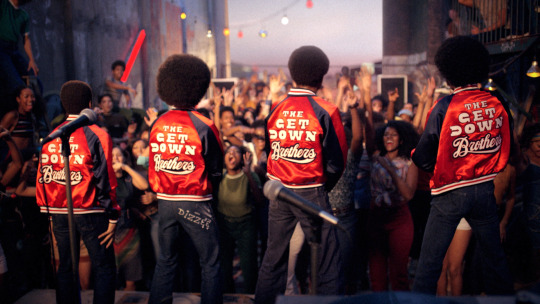
What is it: A Netflix Original series
Who makes it: dir. Baz Luhrmann
Why you should watch it: Almost the entire cast are people of color, it’s set in the 1970s and focuses on both the dying out of disco and the arising hip-hop scene, and the performances are incredible. You see this world through young Zeke’s eyes, a complex and talented kid looking to be a part of something bigger than himself and for a community to fall back on. No matter what’s going on, the story never lets you forget these characters are in the middle of the South Bronx in the seventies, fighting for a way out of poverty, strict religious family, or gangs, all while holding on to their passions. The music and the performances of these young actors are what sold me immediately. The queer relationship in it (I won’t spoil it) is lovely and gentle and blooms very naturally. The story, the characters, and the music are the focus, and if you’re like me, you’ll be hooked immediately. The second season just came out this month and it’s incredible but holy shit so intense. Catch it on Netflix!
3. Carry On

What is it: A young-adult novel
Who makes it: Rainbow Rowell
Why you should read it: Did you read Harry Potter and think: “Wow, Harry is super bi. Wow, he’s pretty obsessed with Draco. Wow they could be friends if Harry was sorted into Slytherin WOW THEY COULD EVEN BE MORE THAN THAT!” ...Okay, well this is the book for you. Set in a magic school more different from Hogwarts than you’d think, Simon and Baz are roommates that hate each other. But things are complicated when you’re the chosen one and you think your roommate might be a vampire and there’s an evil something out for you. It’s like Harry Potter except different and more queer people and people of color. Plus a happy ending that’s so, so much better than that “17 years later” shit. If you like gay magical boys and ass-kicking best friends and plot twists, you’ll definitely enjoy this.
4. Fourth Man Out

What is it: A 2016 movie
Who makes it: dir. Andrew Nackman
Why you should watch it: If you’ve been searching your whole fucking life for a queer rom-com like me, this’ll make you immensely happy. The story centers around Adam, who comes out to his mostly clueless friends in his twenties. They’re all a little uncomfortable and shitty at first, but they all grow and learn and by the end of the film have created the kind of caring and casual atmosphere any queer person hopes for when initially coming out to friends. The movie explores those awkward first steps after coming out, including online dating and homophobic neighbors, in a comedic yet respectful way. It’ll make you laugh and it’ll make you care a lot about Adam-- his puppy-dog face just makes you root for him from the beginning. Watch this if you hate that more comedies don’t center around queer themes, and then please recommend me more!!
5. About a Girl
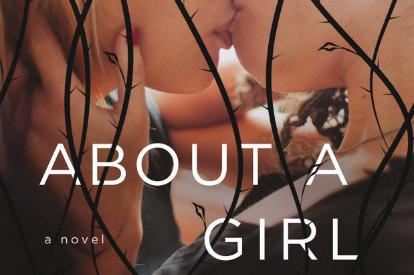
What is it: A young-adult novel
Who makes it: Sarah McCarry
Why you should read it: Okay, maybe you should read the first two books in this series first, All Our Pretty Songs and Dirty Wings, but I read this one first and I think it can stand alone pretty well. There is an abundance of queer people of color in this, a beautiful, mythological storyline, a girl/girl romance, and a main character you’ll fall in love with. This book is so gorgeous to read and so rewarding, and I couldn’t put it down. In fact, I’m due for a reread... good thing I just impulsively bought all three of these so now I OWN THEM. Please, please give at least About a Girl a read, though-- the lyrical, soft nature of it was so incredibly healing and I can’t tell you how much I loved it.
5. Moonlight
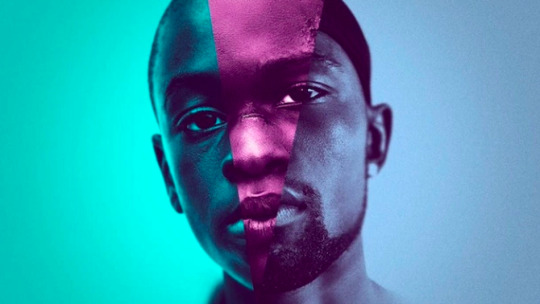
What is it: A 2016 film
Who makes it: dir. Barry Jenkins
Why you should watch it: First of all, if you haven’t been following the mess that happened at the Oscars with La La Land being announced incorrectly and this film winning Best Picture, where have you been? I saw this rather recently, I’ll admit, but it blew my socks off. This film is so completely centered on the experience of black queer men, and allows them to be so honest and tender, so complex and multi-faceted, in a way we haven’t much seen in mainstream media so far. We know why this is-- mainstream media is overwhelmingly white, overwhelmingly straight, and wants to put down and silence differing experiences as much as possible, making Hollywood a boring and homogeneous space. But Moonlight has broken through and shown that when these stories are told, and they are listened to, something incredible can happen.
6. Ask the Passengers
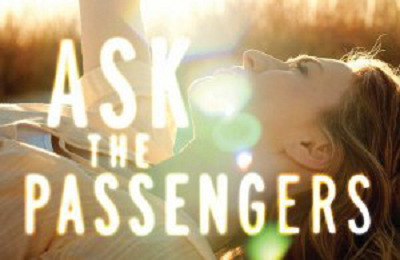
What is it: A young-adult novel
Who makes it: A.S. King
Why you should read it: Holy shit, y’all, I loved this book so fucking much. I reread it a little while ago and it still punches me in the gut just as hard. The book centers around Astrid, a teenager navigating her sexuality, her family, and suffocating small-town life. She’s a philosopher at heart, so nothing comes easy, especially not love-- it’s not as clear-cut as her other queer friends may think. This is a really honest portrayal of figuring out sexuality and Astrid is such a lovable narrator that you just want to bundle her up and let no one else hurt her. The book hit close to home as a queer girl who spent a lot of time figuring out my identity and what it meant to me personally. If you have a similar story, prepare to get emotional.
7. One Day at a Time

What is it: A Netflix original series based off Norman Lear's 1975 series of the same name
Who makes it: Too many directors & executive producers to name! But if you’re a Norman Lear fan, he stayed on to be an executive producer for the remake.
Why you should watch it: The show centers around a Cuban-American family living in California and tackles topics like immigration, religion, sexuality, PTSD, divorce/separation, and more. Elena’s coming out storyline is beautifully and respectfully done and I really appreciate how realistic it is. This show will make you laugh and make you cry, but mostly, you’ll just fall completely in love with the Alvarez family and their story. And they’ve just been confirmed for a second season!! (GET ELENA A GIRLFRIEND!!)
8. The Real O’Neals

What is it: An ABC comedy series
Who makes it: Executive producer Dan Savage
Why you should watch it: Okay, I’ll admit, I have more problems with this show than the others-- namely its consistent biphobia and very few characters of color-- but besides the problems, it’s still hilarious and honest. In the very first episode, Kenny comes out to his conservative, Irish Catholic family in an... explosive way, and what follows is them all trying to figure out how to navigate his identity while still being religious. It’s important to see representation of queer people who keep their faith after coming out; it reminds us that religion and queerness aren’t mutually exclusive. Plus, I love Kenny’s relationship with his siblings, and the fact that his younger sister Shannon is the smartest and most put-together of them all. The show just finished its second season, and as of yet there has been no announcement of a renewal for a third season.
9. The Raven Cycle
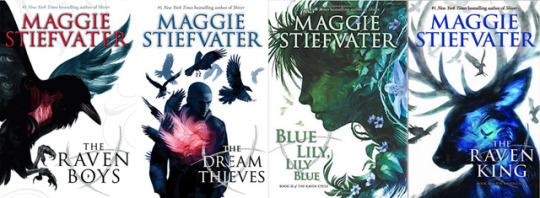
What is it: A young-adult novel series
Who makes it: Maggie Stiefvater
Why you should read it: Holy wow, this book series is fantastic. I had no idea what it was about when I read it (because I read it for the gays...), but the story is complex and fascinating. Blue is our narrator most of the time, the daughter of a psychic who has no psychic abilities herself and who lives in a house with a bunch of other awesome psychic ladies. Her life has always been surrounded by magic, but it gets even more magical when she meets Gansey, Ronan, Adam, and Noah, four boys who go to the near Aglionby Academy and are dubbed “Raven Boys” because of the raven on their uniforms. I’m pretty sure shit starts to get Really Actually Gay in the last book, but the entire series is fantastic and well worth a read. If you like ghost boys, dead kings, magical dreamers, and weird curses, this series is for you. It’s recently been announced that there will be a TV show based on the books, and there will also be another book series just about Ronan, so I’m super pumped for those cool things... Unless they ruin the TV show, in which case I will be incredibly disappointed. (In the meantime, though, you can read the first chapter of the first book, The Raven Boys, here!)
10. Yuri On Ice
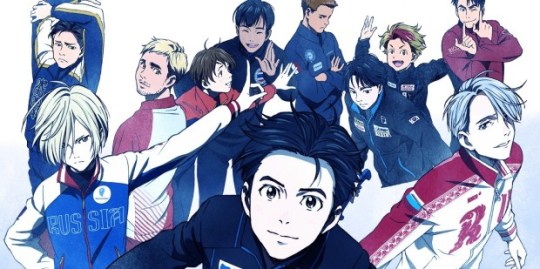
What is it: An Japanese sports anime series
Who makes it: Creator Mitsurō Kubo, dir. Sayo Yamamoto
Why you should watch it: LISTEN, I’ve never finished an anime before this, because I’m not really that into anime. But this series is about figure skating, has twelve episodes, and is hella gay, so it’s not hard to binge it. (For the love of God, please watch the subbed version if you can, the dub voices give me nightmares.) The story is beautifully done, Viktor and Yuuri’s relationship is stable, loving, and realistic, and the portrayal of Yuuri’s anxiety is so important and made me cry in spots. Plus, it’s really funny and the competition scenes are thrilling as all hell. You can watch the series in literally a day, so what are you waiting for?? Binge it and then listen to the soundtrack on Spotify on repeat while crying, like I did.
11. Brooklyn Nine-Nine
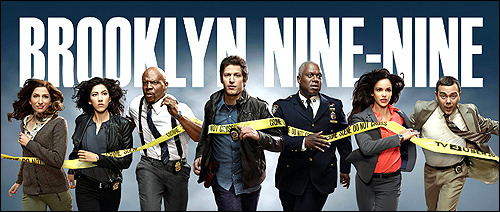
What is it: A Fox-produced police sitcom
Who makes it: A million directors and producers, it’s a comedy sitcom
Why you should watch it: A diverse ensemble cast, comedy that isn’t at the expense of any marginalized group, complex characters, a stable gay relationship, Andy Samberg??? I love this show so much, y’all. To be fair, the main relationship is between a man and a woman, but the captain of the 99th precinct is an openly gay black man who’s in an amazing, loving relationship with his husband. And the relationship between Jake, the main character, and Amy (Spoiler! But you’ll see it coming from a million miles away, promise.) is one of the most delicious slow-burn plotlines I’ve ever seen. And as far as I know, the writers have no intention to break them up for “conflict” (cough cough New Girl cough). In an episode from the current season, a character called something transphobic, which was the first time I’ve ever heard that word on television, and I had to pause and look at my girlfriend in wonder, like “Did he just really say that? Oh my God??” Anyway. Please watch this show. It’s currently in its fourth season, just recently back from its haitus, so go binge it now!
There’s so many more to add to this list (Legend of Korra! Rock and Riot!! Etc etc etc!), but since you now have 11 new (or not-so-new) pieces of queer media to consume, I’ll leave you with that. Till next time!
1 note
·
View note
Photo
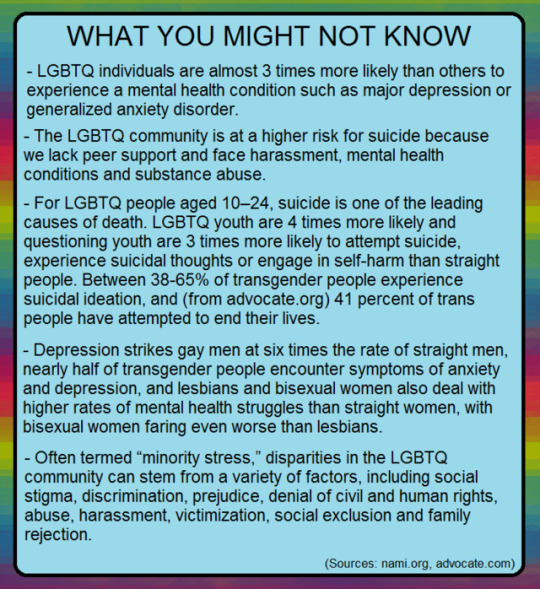
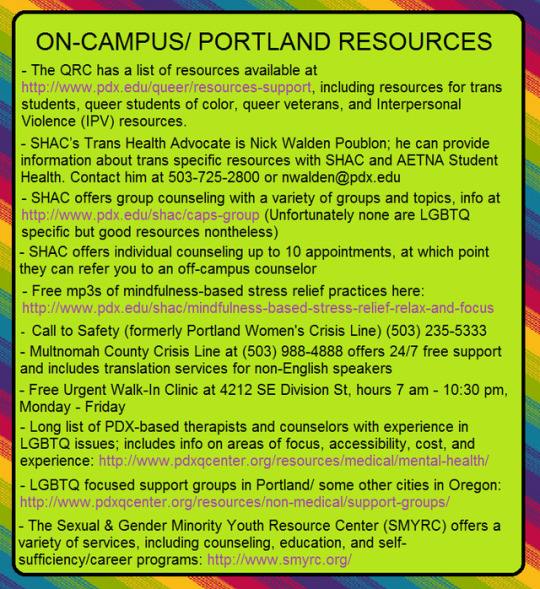
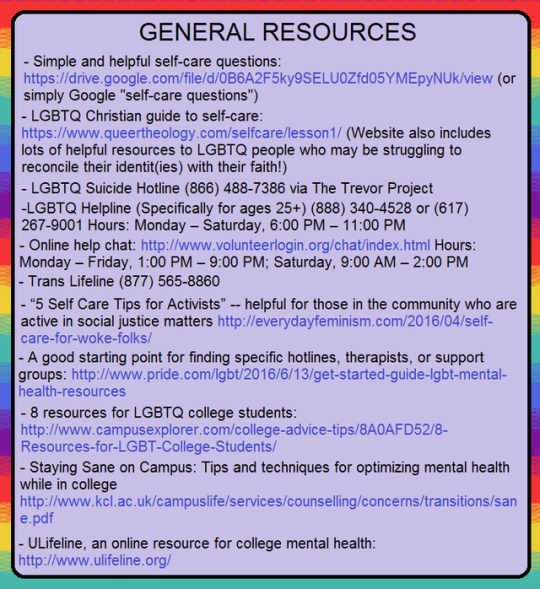
Piper Gibson | March 19, 2017
I made these LGBTQ+ mental health resource sheets for a class last term, and while some of them are Portland/PSU oriented, there are some great resources in here that anyone can use!
LINKS UNDER THE READMORE!
http://www.nami.org/
http://www.advocate.com/
https://www.pdx.edu/queer/resources-support
https://www.pdx.edu/shac/caps-group
https://www.pdx.edu/shac/mindfulness-based-stress-relief-relax-and-focus
http://www.pdxqcenter.org/resources/
http://smyrc.org/
https://drive.google.com/file/d/0B6A2F5ky9SELU0Zfd05YMEpyNUk/view
https://www.queertheology.com/selfcare/lesson1/
http://www.volunteerlogin.org/chat/index.html
http://everydayfeminism.com/2016/04/self-care-for-woke-folks/
http://www.pride.com/lgbt/2016/6/13/get-started-guide-lgbt-mental-health-resources
http://www.campusexplorer.com/college-advice-tips/8A0AFD52/8-Resources-for-LGBT-College-Students/
http://www.kcl.ac.uk/campuslife/services/counselling/concerns/transitions/sane.pdf
http://www.ulifeline.org/
0 notes
Photo
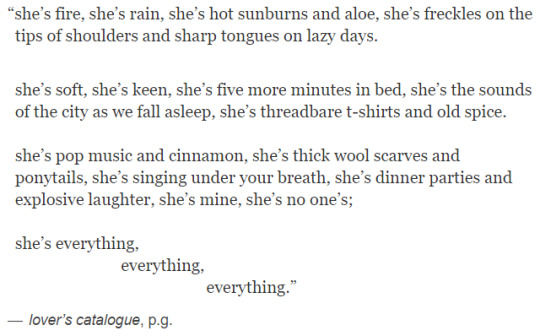
Piper Gibson | March 19, 2017
2 notes
·
View notes
Text
Poussey in OITNB: Art Reflects Life
Piper Gibson | March 19, 2017
(Note: This was originally written in July 2016 in a very emotional state, so please let me know if I need to correct anything about it! Warning: This piece discusses death, both in fiction and in real life-- specifically, the Orlando shooting.) Bear with me: This is a very depressing read. But I am very angry, and very sad, and I needed to collect my thoughts about this.
I’ve just finished the new season of Orange is the New Black. And by ‘just’, I mean I literally finished it an hour ago, so this is all fresh in my mind. It took me more than a month to watch 13 one-hour episodes, which if you know me, you know that’s a long time.
I couldn’t watch it for a while. I emotionally did not have the strength to press play on the new season because only a day or two after the season became available, I heard what happened to Poussey. I heard that they killed her and I couldn’t do it. It felt like mourning a loss, and I hadn’t even seen the episode.
But after a while, I decided that in order to talk about how angry I was, how hurt and upset and tired, I had to watch the episodes myself. I Googled what episode Poussey died in, and Google told me it was the finale, so I thought, “I can do this. I’ll watch all the episodes and give myself extra time for the finale because I know it’ll be hard for me.”
Then I got to episode 12, the second to last episode, the actual episode Poussey dies in (Google lied to me! Don’t believe everything you see on the Internet). It caught me off guard and I wasn’t expecting it to happen before the finale and the scene was so intense and I was so upset that I very nearly had an anxiety attack and was anxious for the rest of the day. Yes, an episode of a TV show with fictional characters almost gave me an anxiety attack. I’ll tell you why.
Poussey is not real, but she’s my friend. She is a girl I know for certain I’d be friends with in real life. She is sweet, and kind, and goofy, she is intelligent and loves books, she geeks out in front of celebrities she looks up to. She spreads love and joy and she cares with her full heart. She’s also black, and queer.
I’ve seen so many people saying stupid shit to those of us who are grieving her death, like “She’s not real, it’s a TV show” and “It’s just a character.” That’s not fucking true. It’s not just anything. This is my life. For the people in the LGBTQ+ community, it’s our lives. Especially to queer women, and even more especially to queer black women. I recognize that as a white woman, my grief and anger does not even compare to what WOC in the community are feeling, and I extend my love and my shared grief and anger to them.
We are angry because they won’t stop killing us. Not in TV, not in movies, not in life. I can’t watch anything with a queer woman in it without the fear that she’ll die at some point. I was looking up stats and one showed that 84% of shows with lesbian/bi women characters have no happy endings for those characters, whether it’s death or being written off or having their girlfriends die. Eighty four percent. Do you know what kind of message that sends to queer women? Do you understand why I am so tired of this?
Media tells me girls like me have no happy ending. Media tells me either I or my girlfriend will tragically die young. Media tells me that I am not worth writing about, that my story and my life and my love and my existence is not worth anything. They kill me off for shock value. They use me as a plot device. They give straight people interesting and complex narratives, and they don’t kill them. At least, they don’t do it at the alarming rate they do with queer women.
They kill us off on TV, and they kill us in real life. The Orlando shooting happened 5 days before the new season of Orange is the New Black was released. A man killed 50 of us in a gay club, and almost all of the victims were Hispanic. Orange is the New Black killed a black lesbian, beloved by the community, 5 fucking days after 50 queer people of color were murdered in a gay club. We were still mourning. (We are still mourning. We will never not be mourning.) We hadn’t had a second to fucking breathe, and they killed another one of us, this time on TV. See how art reflects life? We can’t fucking escape it. None of us can escape this, no matter where we turn. Not even in a TV show that we watch to escape our real problems, like the fear of being murdered in a one of the only places we feel safe, in a place that belongs to us during the month that belongs to us.
I’ve seen people argue that if they were going to kill someone off of Orange is the New Black, they would’ve been hard pressed to find a straight white woman (or man) to do it with. To that I say: So fucking what. Then don’t kill us. Poussey was a character with decent screentime, but not a main character by any means. I can think of several white straight women on that show with the same amount of screentime as her. But they wouldn’t kill any of those women. They killed Poussey for a reason. Why?
They killed her because we loved her. They killed her because she was ours. They did this to shock us, but they must have misunderstood what we have been through our entire lives with other media because this doesn’t fucking shock me. I am not shocked.
I am tired.
1 note
·
View note
Text
Why Bisexual Rep Is Important
Piper Gibson | March 17, 2017 (Note: This was written on September 23, 2016, so anything that has occurred in the shows mentioned in terms of representation may be missing. If so please let me know and I’ll correct it!) In honor of Bisexual Visibility Day, I wrote a little something. And if you’re curious why this day is named for visibility, not celebration or appreciation, then just read on.
So, it’s not that I didn’t know gay people existed when I was a kid.
I knew. I grew up watching Friends, after all; Ross’s ex-wife Carol and her partner Susan were lesbians. I watched Ellen with my grandma. When Glee first aired I was in eighth grade. I knew that there were people out there that were gay, and we had family friends that are gay that I’d met once or twice. But I had no fucking clue about anything else, and I definitely didn’t know what the hell “bisexual” meant until I was in my teens.
I don’t have a specific memory of learning about the word, but there was certainly a few years of a gap between gaining the knowledge and applying it to myself. I figured it out somewhere around junior year of high school, and came out to my parents in the winter of my senior year. All that time I’d liked girls and hadn’t accepted it, hadn’t let myself feel it. The first time I was suicidal l was twelve, and it was because I had a crush on a girl and didn’t know what to do or how to feel about it.
This is why bisexual representation matters. Because even though I’d seen representations for lesbians and gay men as a kid, I’d never seen me on television. I’d never even heard the word bisexual as an identifying word on tv or in the movies before. (I still haven’t.) Sure, I’d heard the word-- like in Glee, when Blaine is questioning his sexuality and says he might be bisexual, and Kurt, a gay man, replies angrily, “Bisexual is a term that gay guys in high school use when they wanna hold hands with girls and feel like a normal person for a change.” That was the first time I heard the word bisexual on television, is still the only example I can remember, and that’s the message I got about who I was. I was fake. I was a lie. In fact, the word wasn’t even applicable to me-- I wasn’t a gay guy, I was a girl and I was confused and looking for validation. And the media spit in my face.
As far as representation goes, bisexual people have it pretty rough. There is a theme in media, a very dangerous theme, that implicitly shows characters are bisexual and explicitly tells the audience they’re straight. I have example after example of this, files of queerbaiting I’ve stowed in my head for years.
Dean Winchester from Supernatural holds all of his long-standing emotional relationships with men, bonds best with men, is shown to be attracted to men, and only sleeps with/dates women. He is a “womanizer” and his relationships with women never last, whereas he works at his relationships with the men in his life. He cares deeply for them and sacrifices everything for them, but he’s not bi. He’s straight, he sleeps with women, see?
Steve Rogers, AKA Captain America, has healthy, strong, intense relationships with men and women. He’s “not good with girls,” but he’s good with his absolute best friend Bucky, who he’s known since childhood and holds above all else. He falls in love with Peggy Carter, yes, and their brief relationship is important and real, but he also drops everything and flies into enemy lines to rescue Bucky. He becomes a completely different person from grief when he believes Bucky to be dead. When Bucky comes back as a brainwashed soldier and doesn’t know Steve, Steve won’t fight him, and is prepared to die rather than hurt this man who doesn’t even remember him. He drops the shield and stops being Captain America because the alternative is losing Bucky. The writers and actors and media all call Bucky and Steve’s arc a “love story,” but insist that they’re both straight. Peggy happened, right? Bucky slept with loads of women, right?
One of the biggest examples of queerbaiting, BBC’s Sherlock, shows John Watson have relationships with women but above all put Sherlock first, caring for him and supporting him and loving him like he would a boyfriend. He’s Sherlock’s only friend and confidant and they live together and share their whole lives together, but somehow this doesn’t matter because he has relationships with women. There’s even a scene where he yells that he’s not gay, which I remember watching and thinking, “you don’t have to be gay to like the same gender.” But he marries a girl, right? He’s not gay, so what does it matter?
I have so many more examples. Jessica Jones (from the Marvel show of the same name) and her best friend Trish act like ex-girlfriends, are treated by the show as ex-girlfriends, and the first season ends with Jessica saying something she never does-- “I love you”-- to Trish and embracing her. This by all accounts looks like them getting back together, but they both have male romantic interests, so none of that matters. Merlin and Arthur from Merlin have an epic love story and sacrifice life and limb for each other, but they both get girlfriends and eventually, wives. Harry Potter is very into both Draco Malfoy and Cedric Diggory throughout the books but dates only women and marries Ginny in the end. Even in How to Get Away With Murder, where Annalise Keating has explicit relationships with women and men and is very clearly bisexual, they still haven’t said the word out loud. It’s a very scary word, apparently.
Something dangerous happens when media implicitly grants a community representation but doesn’t give them explicitly stated, canon representation. We are told we are shameful. We are told we are bad and dirty and must be kept secret. And when we have the gall to point out how obvious it is for us that these characters are bisexual like we are-- because those in the LGBTQ+ community are taught to read subtext and interpret media for ourselves from a young age-- the general public laughs in our faces. They call us “crazy fans” (which, okay, is super dismissing and dehumanizing and ableist) and tell us that actually, we’re fetishizing these characters, and we need to stop.
It’s different for queer people. There is no explicit bisexual representation. But when I see Jessica Jones look at her best friend the same way I looked at female friends of mine when I was twelve? When I see Merlin and Arthur look into each other’s eyes and smile the same way me and my girlfriend do? It feels the same. It’s just not straight. And the writers of these characters know it. They know it and they use it, because we’re starving for validation and we’ll take anything. They write these scenes, these loving glances, purposely, then turn around and tell us our beloved characters are straight. Why would they not be? They have girlfriends and boyfriends, after all. Nevermind what that says to bisexual men who lean towards dating women and feel weird and shameful about their attraction to men, who watch Supernatural and wonder why they relate so much to Dean. Nevermind what that says to bisexual women who watch women on screen be physically affectionate and loving towards each other and who are told that this is strictly platonic; female friends are all like this, and it’s definitely not romantic.
Television does not seem to understand the possibility of being attracted to more than one gender. For me, someone who’s loved every gender since I can remember, it seems strange to only like one gender. I love boys and I love girls and I love everyone in between, and this isn’t taken away by me currently dating a girl. I wasn’t straight when I dated a boy in high school, and I’m not a lesbian now. But in television, you’re a straight woman if you date men. You’re a straight man if you date women. Nothing else matters, especially not your long-standing, emotional, loving relationships with the same gender.
There is a problem in the media with being afraid of this word. I’d like to know why that is. More and more shows are including gay characters now, giving them girlfriends and boyfriends and plotlines and interesting stories. (We won’t touch on the “bury your gays” trope here.) But there’s still so, so, so little explicitly defined bisexual characters. If they’re bi, this is shown, not told. We learn they’re bi from them kissing boys and girls, not by them mentioning it. This is a clear distinction, and it’s important to note. I can’t think of a single example of something I’ve watched or read where a character said themselves that they were bisexual. Self-identifying, strongly and confidently, is important. Not being outed, not just showing their identity by making out with multiple genders, and not saying a stupid cop-out like “well, sexuality is fluid” or “I’m not straight or gay, I’m just… y’know.”
No. Young bisexuals don’t know. Young me didn’t know. If I had been watching TV and heard someone call themselves bisexual, proud and clear, I’d have sat up. I’d have listened. I wouldn’t have had to watch show after show, movie after movie, read book after book and gone to my other queer friends, saying with raised eyebrows, “This is fucking gay, right? I’m not the only one?”
We see your implicit representation and we want better. We deserve better. We demand better, for us and for young bisexuals, their stomachs sinking every time they watch TV and a joke is made about two characters of the same gender being “too close.” My stomach sank when I was a kid and I watched Joey and Chandler hug and say “We do this too much, don’t we?” and break apart.
I didn’t know why then, but I do now. And I-- we-- deserve better.
And to not end this on a sad note, I do have hope. I am tired of queerbaiting and biphobia, but I have hope. When I was a kid I had nothing-- at the very least now, I have characters on TV who kiss people of multiple genders. Eventually they’ll be allowed to say that they’re bisexual out loud, but for now I have confirmation from show runners that I was right, that they are bi. For now I have amazing bisexual Youtubers like Dodie Clark and Chris Kendall and Alayna Fender. For now I have Korra from Legend of Korra and Jack Zimmermann from Check, Please! (READ IT HERE) and Annalise Keating from How to Get Away With Murder. For now I hold the little rep I have close to my heart and wait for a better time, a time when “bisexual” is not a scary word to say on television or in movies. After all, we have all these angry bisexuals with no representation and a fierce desire to see themselves in media. That’s just a recipe for shit to get done.
1 note
·
View note
Text
Hello void! Have some music!
Piper Gibson | March 17, 2017
Hey, everyone (aka, void of internet that I’m talking into currently)! I thought for the first post here on violetminds I’d make a little collection of my favorite music from LGBTQ+ artists! I’ll be adding my own work-- and hopefully other people will start to submit work-- within the next few days, but in the meantime, here’s some good queer tunes for your ears.
1. Keerthi Sridharan
Keerthi is a personal friend of mine, and y’all, she is so. Damn. Good. Her voice is one of the best I’ve heard in years and her lyrics are really creative and unique, not to mention the awesome harmonies or jam-able ukulele playing. (Can you tell I’m jealous of how talented she is?) She has an iTunes and a Spotify that you should definitely check out and support, and to get you started here’s my favorite song from her, "blur” from her Slow Hands EP.
youtube
2. Julien Baker
I discovered Julien Baker during one of those NPR Tiny Desk Concert holes I get into sometimes, and I instantly became obsessed. Everything she sings is raw and real, her voice is lovely and different, and you can’t help but say “ouch” after listening to her music because it’ll make your damn heart ache. Her album Sprained Ankle is on Spotify and Bandcamp among other places, and here’s my favorite from it, the titular “Sprained Ankle.”
youtube
3. Dodie Clark
I’ve been following Dodie on YouTube for a few years and I’ve never disliked a song of hers. Her music is so soft and honest and either makes you nostalgic for the good times or remember the bad ones. Either way, it’s real, it’s lovely, and I want to absorb everything she creates like a sponge. Her recent EP Intertwined is on Spotify and iTunes, and my favorite song by her isn’t on there (”She” is beautiful and you should definitely go listen to it), so here’s “Sick of Losing Soulmates.” The music video is gorgeous and if it doesn’t make you emotional, I don’t know what will.
youtube
4. Passion Pit
I didn’t know lead singer Michael Angelakos was gay until recently and it made me so happy because I’ve been following the band for years and I can now add them to my gay alt pop playlist!! Gossamer and Manners were part of the collection of albums that got me through high school-- it was music I could turn up really loud and dance to unapologetically, something sorely needed while suffering through teenagehood. They have a ton of music on Spotify and the other usual places, including an album I didn’t know about and haven’t listened to yet, so I’m gonna do that right this second. One of my favorites by them has always been “Constant Conversations,” so here it is now for your listening pleasure.
youtube
5. Hayley Kiyoko
Everyone knows her, the queen of producing queer girl anthems and the creator of amazing music videos like “Girls Like Girls” and “One Bad Night,” and I’m especially pumped to put her on this list because I saw her Portland show with my girlfriend recently and it completely rocked my world. She’s an incredible performer, honest and creative and talented to her bones, and listening to explicitly gay songs makes my heart sing, so I just love her to pieces. Her latest EP Citrine is on Spotify and iTunes, and I can’t pick a favorite from it so I’ll just go with “Ease My Mind” because what a chorus.
youtube
6. Ben J. Pierce
He only has two songs out at this point (under the pseudonym Benny) but both are incredible and discuss the harmful effects of toxic masculinity and gender roles. Both music videos are intense and gorgeous, his lyrics fresh and on the edge of slightly creepy. But hey, the patriarchy is creepy. Here’s my favorite of the two singles, “Boys Will Be Boys.”
youtube
7. Troye Sivan
Okay, maybe everyone’s over Blue Neighbourhood, but I definitely am not. Troye was one of the first queer artists I really got into because he was one of the first queer YouTubers I really got into, and I’ve listened to his album probably a hundred million times by now. I love the dreamy, nostalgic, honest vibes, and the Blue Neighbourhood Trilogy of music videos are poignant and beautiful so you should definitely go watch those-- I’d recommend the director’s cut because it puts them all in one. He also has a Spotify so you can listen to “WILD” feat. Alessia Cara on repeat forever (I’ve definitely done this). But if you’re unlike me and tired of that album, here’s a song from his first EP TRXYE, one that in my opinion doesn’t get enough attention, called “Touch.”
youtube
8. Tegan and Sara
What would any good collection of queer musicians be without Tegan and Sara? It took me embarrassingly long to get into them, but in my defense, I was pretty deep under internalized homophobia as a teen so I was avoiding all of the “lesbian music.” I love both the older, acoustic indie vibes and the newer poppy vibes, but I gotta say, I’m a sucker for music I can dance to. Their most recent album Love You to Death of course has a Spotify and iTunes, and one of my personal favorites from it is “Stop Desire.”
youtube
9. Halsey
We all know Halsey at this point, and to some she may be overrated, but I still listen to Badlands a lot and got a little too excited at the announcement of her sophomore album coming out in June. I love her frank and unapologetic discussions of her intersecting identities, something that is often missing from mainstream feminism. Plus, her music’s just really fucking good. Her last album Badlands is on Spotify and iTunes, and here’s a more underrated (imo) song from it, called “Roman Holiday.”
youtube
10. Kehlani
I probably have listened to Kehlani’s latest album, SweetSexySavage, about 20 million times. I discovered her pretty recently and haven’t been able to get certain songs out of my head-- the easy, danceable beats, the amazing vocals, the honest lyrics-- all of it makes for an amazing, comprehensive album. If you haven’t heard her yet, 1. what are you doing, and 2. go look up her Spotify and iTunes and educate your damn self. Here’s one of my favorites from the album, “Piece of Mind.”
youtube
2 notes
·
View notes